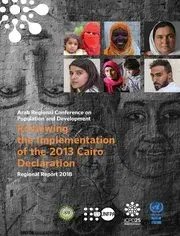In 1994, a global revolution started in Cairo at the International Conference on Population and Development (ICPD). World leaders recognized individuals’ right to make their reproductive choices freely and responsibly, and agreed that women’s empowerment is a precondition to development. For the first time, the ICPD Programme of Action introduced a rights-based approach to the nexus between population and development. On ICPD’s 20th anniversary, the Arab states came together to renew their commitment to its revolutionary agenda within the context of region-specific challenges. With UNFPA’s support, this effort produced the 2013 Cairo Declaration which charted the way ahead for the region’s quest to fulfill the ICPD promise.
Five years after the Cairo Declaration was developed and 25 years after the ICPD Programme of Action was adopted, the five-year implementation of the 2013 Cairo Declaration and the outcome document of the Regional Conference on Population and Development in the Arab States held in Beirut from October 30th to November 1st 2019, was jointly led by the Arab States Regional Office of the United Nations Population Fund (UNFPA ASRO), the United Nations Economic and Social Commission for Western Asia (ESCWA), and the League of Arab States (LAS).
The review comes at a crucial time in the region’s history characterized by a great deal of diversity in population dynamics and trends, and inequality of wealth and income between different countries. The region is also home to some of the world’s worst humanitarian crises and is witnessing the largest forced migration movement globally.
Nevertheless, the region has made remarkable progress towards achieving the vision of the 1994 (ICPD) in Cairo and the Millennium Development Goals. Periodic regional reviews have documented: discernible declines in infant, child and maternal death rates; improved reproductive health care and family planning services; a reduction in unmet needs for family planning and reproductive health services; increasing school enrolment ratios; improved gender parity in education; a drop off in extreme poverty; increased urbanization; and improved access to safe water and sanitation. Progress was not evenly distributed throughout the region and some countries clearly lag behind. Several major challenges remain. These include: high unemployment rates among young people; low quality of education; a lack of adequate youth-friendly services; weak youth participation; weak economic and political participation of women; developmental disparities between urban and rural areas; persistent cultural obstacles to gender equality; and the prevalence of gender-based violence.
This review traces the progress the region’s countries have made in regards to the four core commitments of the Cairo Declaration namely: ensuring dignity and equality for marginalized and vulnerable groups and populations, providing universal access to reproductive and sexual health, taking a rights-based approach to international migration problems, and working towards environmental stability.


